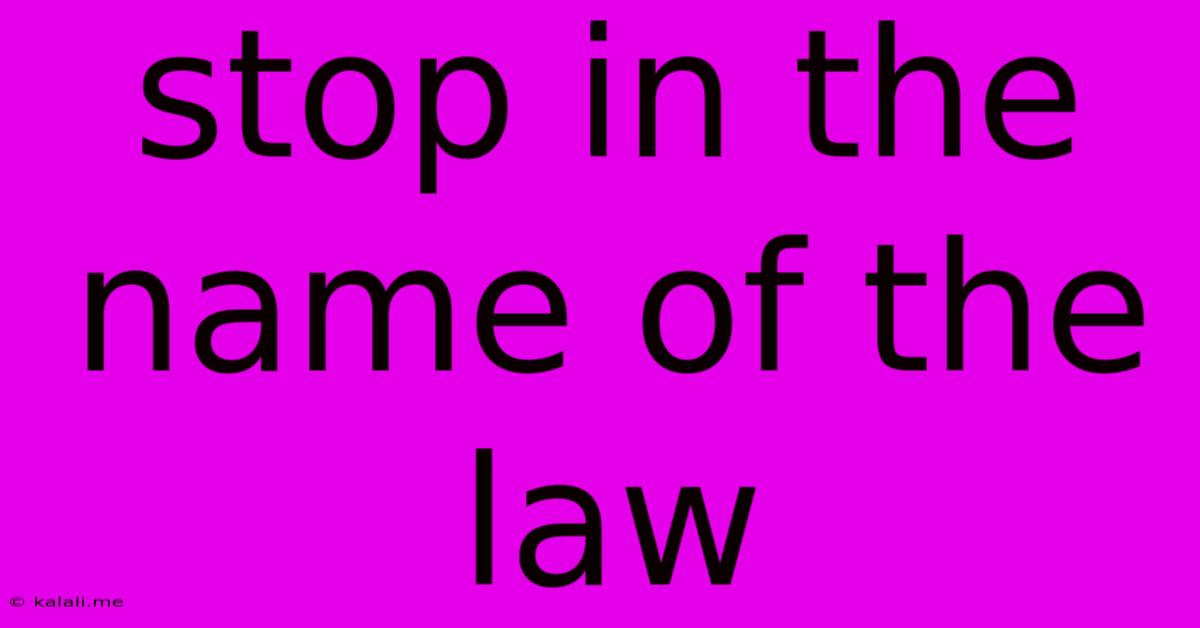Stop In The Name Of The Law
Kalali
May 23, 2025 · 3 min read

Table of Contents
Stop in the Name of the Law: Understanding Legal Authority and Citizen Rights
This article explores the often-misunderstood interaction between citizens and law enforcement, focusing on the concept of "stop in the name of the law," its legal basis, and the rights individuals possess during such encounters. Understanding these rights is crucial for ensuring fair treatment and protecting yourself from potential abuse of power.
What Constitutes a "Stop in the Name of the Law"?
A "stop in the name of the law" refers to a brief detention by a law enforcement officer based on reasonable suspicion of criminal activity. This is distinct from an arrest, which requires probable cause. During a stop, an officer may briefly detain you, ask for identification, and question you about your activities. The key differentiator is the brevity and the lack of formal arrest procedures. The officer must have articulable facts supporting their reasonable suspicion – a hunch isn't enough. This reasonable suspicion must be based on specific and articulable facts, not merely a feeling or gut instinct.
Legal Basis and Limitations:
The legal basis for a stop in the name of the law varies depending on jurisdiction. However, the underlying principle generally stems from the need for law enforcement to investigate potential crimes efficiently and prevent further criminal activity. This power, however, is not unlimited. The officer's actions must be reasonable and proportionate to the perceived threat. Unnecessary force or prolonged detention without a clear justification can be grounds for legal action.
Your Rights During a Stop:
While you are obligated to cooperate with a lawful police stop, you retain several crucial rights:
-
Right to Remain Silent: You are not required to answer any questions beyond providing your name and address (requirements vary by location). Anything you say can and will be used against you in court. Politely but firmly asserting your right to remain silent is perfectly acceptable.
-
Right to an Attorney: You have the right to speak with an attorney before answering any questions. If you are detained for an extended period, you can request to contact a lawyer.
-
Right to Refuse a Search (Generally): While an officer may pat you down for weapons if they have reasonable suspicion you are armed and dangerous, they generally need a warrant to search your person or belongings. You can refuse a search, though refusing may escalate the situation. It's wise to be polite but firm in your refusal.
-
Right to Record: In many jurisdictions, you have the right to record the interaction with law enforcement, provided you do so openly and without interfering with the officer's duties.
-
Right to Know the Reason for the Stop: The officer should clearly articulate the reason for the stop, providing specific details about the suspected criminal activity.
What to Do if You Believe Your Rights Were Violated:
If you believe your rights were violated during a police stop, document the incident as thoroughly as possible. Note the date, time, location, officer's name (if possible), and a detailed account of what happened. Gather any evidence you can, such as witness statements or recordings. Consult with an attorney to discuss your options.
Conclusion:
Understanding your rights during a "stop in the name of the law" is vital for all citizens. By knowing your rights and acting appropriately, you can protect yourself from potential misuse of authority and ensure a fair and just interaction with law enforcement. Remember, asserting your rights doesn't necessitate confrontation; it's about ensuring respectful and legal treatment. Being informed and assertive is key to navigating these encounters effectively.
Latest Posts
Latest Posts
-
Words Ending In S Not Plural
May 24, 2025
-
How To Change Light Bulb In Flat Ceiling Fixture
May 24, 2025
-
Is Dot 4 Compatible With Dot 3
May 24, 2025
-
Complete Statistics How To Prove Parameter Space Contain Open Set
May 24, 2025
-
Liust Of Soql Inside For Loop
May 24, 2025
Related Post
Thank you for visiting our website which covers about Stop In The Name Of The Law . We hope the information provided has been useful to you. Feel free to contact us if you have any questions or need further assistance. See you next time and don't miss to bookmark.